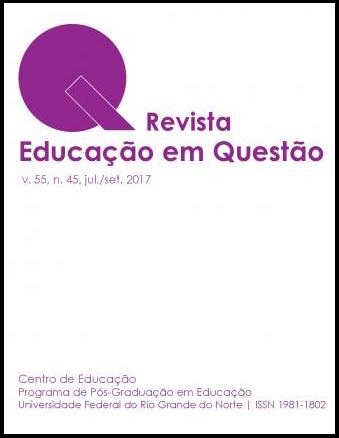O método Life Kinetik® sob a perspectiva das neurociências e educação
uma análise teórica
DOI:
https://doi.org/10.21680/1981-1802.2017v55n45ID12748Palavras-chave:
Aprendizagem. Life Kinetik. Neuroplasticidade.Resumo
Métodos que combinam atividades motoras com atividades cognitivas sob o princípio de desafiar ao cérebro constantemente com novas combinações de atividades, aumentando permanentemente o seu grau de dificuldade, porém, sem exigir um domínio na execução, mostram-se promissores para o processo de ensino e aprendizagem. Um exemplo é o método do Life Kinetik (LK), desenvolvido por Lutz (2014). No presente estudo, objetivou-se, com base na literatura da área neurocientífica, analisar se os processos que ocorrem no cérebro, atribuídos ao fenômeno da aprendizagem, poderiam ser estimulados por esse método. Os resultados desse estudo mostraram que pesquisas, na área das neurociências, revelam que os processos de plasticidade cerebral que medeiam os processos de aprendizagem são potencializados mediante atividades que incluam três fatores-chave: desafio, variedade e não-perfeição, sendo que esses são considerados metodologia essencial do Life Kinetik.
Downloads
Referências
BRASIL. Lei nº 13.005, de 25 de junho de 2014. Aprova o Plano Nacional de Educação - PNE e dá outras providências. Diário Oficial da República Federativa Brasília, DF, 26 jun. 2014.
CARLSON, Neil. R. Physiology of Behavior.11. ed. Boston: Pearson, 2012.
CATANIA, Anthony. Aprendizagem: comportamento, linguagem e cognição. Porto Alegre: Artmed, 1999.
GRÜNKE, Matthias. Die Effekte des Life Kinetik®: Trainings auf die Aufmerksamkeits und die fluideIntelligenzleistung von Kindern mit gravierenden Lernproblemen. Heilpädagogische Forschung, v. 37, p. 2-12, mar. 2011.
JACOBSON, Roni. The persistence of memory. Scientific American, New York, v. 312, n. 4, p. 14-16, ago. 2015.
KAISER, Arnim; KAISER, Ruth. Studienbuch Pädagogik: Grund-und Prüfungswissen. 7. ed. Frankfurt am Main: CornelsenScriptor, 1994.
KANDEL, Eric, SCHWARTZ, James; JESSELL (Org.). Principles of neural science. 5 .ed. New York: McGraw-Hill Education/Medical, 2012.
KOSKI, Lisa; WOHLSCHLÄGER, Afra; BEKKERING, Harold; WOODS, Roger; DUBEAU, Louis; MAZZIOTTA, John; IACOBONI, Marco. Modulation of motor and premotor activity during imitation of target-directed actions. Cerebral Cortex, Oxford, v. 12, n. 8, p. 847-855, ago. 2002.
LIFE KINETIK. Coordenação de Horst Lutz, Josef Bauer e Maria Schweyer. Desenvolvido por Cinderella GmbH, Ebenhausen. Apresenta links sobre o Life Kinetik. Disponível em:<http://www.lifekinetik.de>. Acesso em: 5 mar. 2017.
LUTZ, Horst. Zusammenfassung der wissenschaftlichen Referenzen. LIFE KINETIK, Site coor- denado por Horst Lutz, Josef Bauer e Maria Schweyer e desenvolvido por Cinderella GmbH, Ebenhausen; online. Disponivel em: <http://www.lifekinetik.de/infos/wissenschaftliche-zusammenfassung/>. Acesso em: 5 mar. 2017.
LUTZ, Horst. Life Kinetik®: Gehirntraining durch Bewegung. 4 ed. München: blv Buchverlag, 2014.
LUTZ, Horst; NEUREUTHER, Felix. Mein Training mit Life Kinetik®. 3. ed. München: Nympfenburger, 2013.
MATTFELD, Aaron; STARK, Craig. Functional contributions and interactions between the human hippocampus and subregions of the striatum during arbitrary associative learning and memory. Hippocampus, Boston, v. 25, n. 8, p. 900-911, ago. 2015.
MAYES, Andrew; ROBERTS, Neil. Theories of episodic memory. Philosophical transactions of the Royal Society of London, London, v. 356, n. 1413, p. 1395-1408, set. 2001. (Series B: Biological Sciences).
ORGANIZATION FOR ECONOMIC CO-OPERATION AND DEVELOPMENT (OCDE). Country note Brazil: Programme of International Student Assessment (PISA): Results from PISA 2012. Disponível em:<http://download.inep.gov.br/acoes_internacionais/pisa/resultados/2013/country_note_brazil_pisa_2012.pdf> Acesso em: 2 mar. 2017.
ORGANIZATION FOR ECONOMIC CO-OPERATION AND DEVELOPMENT (OCDE.). Understanding the brain: The birth of a new learning science. OCDE. 2007. Disponível em: <http://www.oecd.org/edu/ceri/understandingthebrainthebirthofalearningscience. htm#B1>. Acesso em: 2 mar. 2017.
PEREIRA, Ana; HUDDLESTON, Dan; BRICKMAN, Adam; SOSUNOV, Alexander; HEN, Rene; MCKHANN, Guy; SLOAN, Richard; GAGE, Fred; BROWN, Truman; SMALL, Scott. An in vivo correlate of exercise-induced neurogenesis in the adult dentate gyrus. Proceedings of the National Academy of Sciences, Washington, v. 104, n. 13, p. 5638-5643, mar. 2007.
RAMACHANDRAN, Vilayanur. O que o cérebro tem para contar: desvendando os mistérios da natureza humana. Rio de Janeiro: Zahar, 2014.
ROTH, Muriel; DECETY, Jean; BACIU, Monica; MASSARELLI, Raphael; DELON-MARTIN, Chantal; SEGEBARTH, Christoph; MORAND, Stephanie; GEMIGNANI, Angelo; DÉCORPS, Michel; JEANNEROD, Marc. Possible involvement of primary motor cortex in mentally simula- ted movement: A functional magnetic resonance imaging study. Neuroreport, London, v. 7, n. 7, p. 1280-1284, maio 1996.
SIMPSON, Joy; KELLY, John. The impact of environmental enrichment in laboratory rats-beha- vioural and neurochemical aspects. Behavioural Brain Research, New York, v. 222, p. 246-264, set. 2011.
THOMPSON, Richard. The neural basis of basic associative learning of discrete behavioral responses. Trends in Neurosciences, New York, v. 11, n. 4, p. 152-155, abr. 1988.
UNGERLEIDER, Leslie; DOYON, Julien; KARNI, Avi. Imaging Brain Plasticity during Motor Skill Learning. Neurobiology of Learning and Memory, New York, v. 78, n. 3, p. 553-564, nov. 2002.
URSIN, Holger. Brain sensitization to external and internal stimuli. Psychoneuroendocrinology, New York, v. 42, p. 134-145, abr. 2014.
VAN PRAAG, Henriette; CHRISTIE, Brian; SEJNOWSKI, Terrence; GAGE, Fred. Running enhances neurogenesis, learning, and long-term potentiation in mice. Proceedings of the National Academy of Sciences, v. 96, n. 23, p. 13427-13431, set. 1999.
VAN PRAAG, Henriette; SHUBERT, Tiffany; ZHAO, Chunmei; GAGE, Fred. Exercise enhan- ces learning and hippocampal neurogenesis in aged mice. The Journal of Neuroscience, v. 25, n. 38, p. 8680-8685, set. 2005.
Downloads
Publicado
Como Citar
Edição
Seção
Licença
À Revista Educação em Questão ficam reservados os direitos autorais no tocante a todos os artigos nela publicados.
A Revista Educação em Questão reserva-se ao direito de não publicar artigos e resenhas de mesma autoria (ou em co-autoria) em intervalos inferiores há 1 (um) ano.






